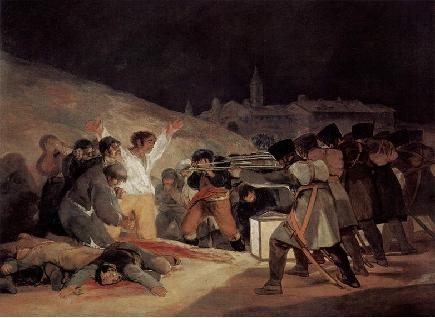This week, we talked a lot about politics and revolution, which, as we know, was a subject that was close to Whitman’s heart, and is reflected in the poetry of his Spanish speaking “descendants” — Lorca and Neruda. In Whitman’s eyes, it would have been a sin above just about all others to discredit or forget the causes, consequences, tragedy of the Civil War, of all the young boys who died in his arms. It was this idea of remembrance, driven by Martin Espada’s poem “Rain Without Rain” that really touched me this week. Hold on, whilst I get up on my soapbox for a minute.
Each nation, including America, has had its own problems of oppression, intolerance, genocide, war, and revolution–there is no denying that. However, I think that Americans in this age have blinders on when it comes to understanding the true horror that other countries have witnessed, and many still witness today. The last war to be fought on our soil, right in front of our very eyes, was over a hundred years ago, and rarely talked about (except in Whitman class). Yes, there was 9/11, a heartbreaking and unnecessary mass murder that boiled my very blood…but one in which the killing lasted a single day. What about the Rwandan Genocide? What about the sex trade and female mutilation that still exists overseas? What about the Nazis? What about the injustices expounded upon by Neruda? These terrible tragedies lasted for months or years. There is no American equivalent, and it seems that our memories of anything close are dying out rapidly. For example, my grandfather served on a battleship during WWII. He is 93 years old and attends the U.S.S. Cleveland reunion each year. And, each year, there are a few less than the year before. Soon there will be none. Less than 10 years after 9/11, and I am already finding people who just see it as a hazy dream.
This is why Espada’s poem fueled me so much. He points out that those who mourn for Neruda should remember to mourn for all others who died for the same cause, and that we must also teach our children to see history not as just a memory, but a scar and a learning tool. We must not be like the one who “blinked with the camera’s flash, shutting his eyes forever.” We are the little girl who reads Neruda too fast, and we must slow ourselves so we can truly understand.
I’ll end with this: I’ve been to Europe several times, and although WWI was nearly 100 years ago, I can tell you that many countries, especially England, still remember the pain. I have never seen so many flowers on a memorial on a day that wasn’t a remembrance holiday. Americans could benefit from such a mindset, and not just in terms of our own country. We are lucky that we are comfortable, and free, and mostly whole, but we should not be blind. We should be grateful.




Powerful post, Lindsey. I really look forward to discussing this poem with you and everyone else tomorrow.
The image of the man who blinked with the camera’s flash struck me different. In the poem, the characters are all wearing portraits around their neck, picture of those who “were disappeared” during the Pinochet regime. While the image of the man with closed eyes is striking–and perhaps representative of how some have chosen to close their eyes to history–it’s important to remember that the man in the picture is also a victim of that history.
First off, excellent painting choice. That Goya is one of my favorites and is actually hanging in my room. I got to see it a couple of years ago and was blown away by the gigantic size of the painting and the weight it carried (very similar to Picasso’s Guernica). It is hard for us, as Americans, to come outside of our American bubble and try to understand the real horrors that go on in the world. In the movie Hotel Rwanda one of the journalists is thanked for getting footage of the genocide, and he replies, “I think if people see this footage, they’ll say Oh, my God, that’s horrible. And then they’ll go on eating their dinners.” Even when we may pay attention to the atrocities going on throughout the world, we tend to just throw petty change at them and expect them to get better on their own. I know that when I read Neruda it is hard for to grasp the weight of his words and the great emotional depth of his poetry.